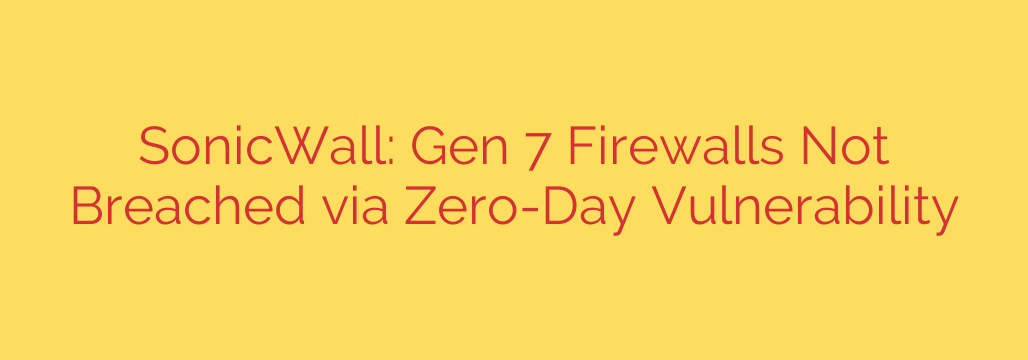
Clearing the Air: Are SonicWall Gen 7 Firewalls Safe From Recent Exploits?
In the fast-paced world of cybersecurity, news of a vulnerability can create significant concern for IT professionals and business owners. Recent reports detailed a critical security flaw exploited by a sophisticated threat actor, leading to questions about the safety of various network security appliances. It’s crucial to address these concerns with clear, accurate information.
If you manage a network protected by a SonicWall Generation 7 (Gen 7) firewall, here’s what you need to know: the recent vulnerability that made headlines did not affect your device. Let’s break down the situation to clear up any confusion and provide actionable security guidance.
The Source of the Security Alert
The initial reports centered on a security vulnerability, tracked as CVE-2024-22449, which was actively exploited in the wild. This flaw allowed for post-authentication remote command injection, a serious threat that could give attackers deep access to a compromised system.
Security researchers linked the exploitation of this vulnerability to UNC5174, a threat group with ties to the well-known, state-sponsored actor Volt Typhoon. The investigation found that this vulnerability was used to breach specific network devices.
However, the critical detail is which devices were affected. The vulnerability was discovered in older, unpatched SonicWall Secure Mobile Access (SMA) 100 series appliances. These are stand-alone products designed to provide secure remote access for employees.
Why SonicWall Gen 7 Firewalls Remain Secure
The most important takeaway for network administrators is that SonicWall Gen 7 firewalls were NOT affected by the CVE-2024-22449 vulnerability.
The reason is simple but technical: they run on entirely different software.
- Vulnerable Devices: The SMA 100 series appliances operate on a legacy firmware known as SonicOSX.
- Secure Devices: The modern Gen 7 firewalls run on the latest SonicOS 7 operating system.
This fundamental difference in the underlying code and architecture means the exploit developed for the SMA 100 series is incompatible with and cannot be used against a Gen 7 firewall. Your firewall’s defenses were not, and are not, susceptible to this specific threat.
Essential Security Best Practices for All Network Devices
While this news provides welcome reassurance for those using modern firewalls, it also serves as a powerful reminder of the importance of proactive security hygiene. A strong security posture is built on layers of defense, not just a single product.
Whether you manage a SonicWall device or another network appliance, these security measures are non-negotiable:
- Apply Patches Promptly: For users of the affected SMA 100 series, a patch has been available for some time. This incident underscores the critical need to apply security updates as soon as they are released to close known attack vectors.
- Enable Multi-Factor Authentication (MFA): MFA adds a crucial layer of security that can prevent unauthorized access even if credentials are stolen. It is one of the single most effective security controls you can implement.
- Restrict Management Access: Never expose your firewall’s or security appliance’s administrative interface to the public internet. Access should be tightly restricted to trusted internal IP addresses and managed over a secure VPN.
- Maintain Up-to-Date Firmware: Regularly check for and install the latest firmware for all your network hardware. Manufacturers constantly release updates that include performance improvements and, most importantly, patches for newly discovered security vulnerabilities.
- Use Strong, Unique Passwords: Ensure all administrative accounts are protected with complex passwords that are not reused across other services.
In conclusion, owners of SonicWall Gen 7 firewalls can be confident that their devices were not impacted by this widely reported vulnerability. However, vigilance remains our best defense in the ever-evolving landscape of cyber threats. By adhering to security best practices, you can ensure your network remains resilient against both known and future attacks.
Source: https://www.helpnetsecurity.com/2025/08/07/sonicwall-gen-7-firewalls-exploit-vulnerability/








